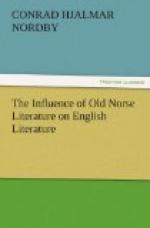There is one more tale in The Earthly Paradise which originated in Norse legend. “The Fostering of Aslaug” is drawn from Thorpe’s Northern Mythology, which epitomizes older sources. Aslaug is the daughter of Iceland’s great hero, Sigurd, and Iceland’s great heroine, Brynhild, and her life is set down in this poem most beautifully. Again we note that the added touches of later poets fail to leave the sense of the strenuous in the picture. Aslaug is like a favorite representation of Brynhild that we have seen, a lily-maid in aspect, or a Marguerite. Her mother’s masculinity is gone, and with it the Old Norse flavor. It is the privilege of our age to enjoy both the virility of the Old Norse and the delicacy of the mediaeval conceptions, and William Morris has caught both.
3.
In the opening lines of “The Fostering of Aslaug,” our poet wrote his doubts about his ability to sing the life of Sigurd in be-fitting manner. At that time he said:
But now have I no heart to
raise
That mighty sorrow laid asleep,
That love so sweet, so strong
and deep,
That as ye hear the wonder
told
In those few strenuous words
of old,
The whole world seems to rend
apart
When heart is torn away from
heart.
(Vol. III, p. 28.)
It is a common complaint against the poetry of William Morris that it is too long-winded. Each to his taste in this matter, but we beg to call attention to one line in the above passage:
In those few strenuous words of old.
Whatever may have been Morris’ tendency when he wrote his own poetry, he knew when concision was a virtue in the poetry of others. There is no better description of the Voelsunga Saga than the above line, and William Morris gave the English people a literal version of the saga, if mayhap that strenuous paucity might translate the old spirit. But, as if he knew that many readers would fail to make much of this version, he tried again on a larger scale, and the great volume Sigurd the Volsung, epic in character and proportions, was the result. Of these two we shall now speak.
The Voelsunga Saga was published in 1870, only two years after Morris had begun to study Icelandic with Eirikr Magnusson. The latter’s name is on the title page as the first of the two co-translators. The Saga was supplemented by certain songs from the Elder Edda which were introduced by the translators at points where they would come naturally in the story. The work, both in prose and verse, is well done, and the attempt was successful to make, as the preface proposes, the “rendering close and accurate, and, if it might be so, at the same time, not over prosaic.” The last two paragraphs of this preface are particularly interesting to one who is tracing the influence of Old Norse literature on English literature, because they are words with power, that have stirred men and will stir men to learn more about a wonderful land and its lore. We copy them entire:




